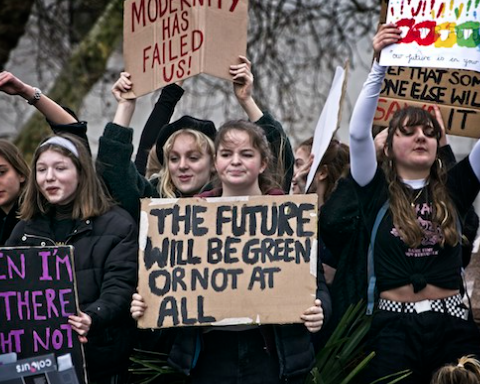By: Emily Kopp
Last week, I heard Spencer Frye recount a tale of being hunted by a Haitian shaman and listened as Gwen O’Looney slurred through the tale of how she narrowly missed contracting cholera in Turkey.
Two weeks ago, a few enterprising story lovers hosted the inaugural “Rabbit Box,” a venue for Athens residents to spin a yarn before a small audience. Word must have gotten out, because the second meeting drew a crowd that filled The Globe’s second floor to the brim. I stood in the cramped walkway to the door as feet were stepped on and awkward side-ways glances were exchanged. The friction from the passing bodies, or perhaps simply from the accumulation of body heat, made the room almost unbearably stifling. At times, in order to see the speakers, it was necessary that I look through a sliver-thin window between someone’s head and the wall. My unfortunate location meant I kept knocking over the titular “Rabbit Box”—a cardboard box with a stuffed animal rabbit sitting whimsically on top. One person fretted that the floorboards would give in and proceeded to devise an escape plan. Another attendee told me later that stifling her vomit had required a conscious effort. It was a nearly intolerable environment, but almost everyone re-entered this infernal sardine can after the intermission. Why did we subject ourselves to this torture? Remarkably, it was simply for the joy of hearing a good story.
Technology has made communication more efficient and more extensive than ever before. Social media allows its users to tell their stories to more people. We can delve into the depths of our personal histories and catch up with people that we otherwise would have lost contact with a longtime ago. Yet this convenience of communication comes at the cost of quality—a phenomenon exemplified by your father every time he asks you to actually call him, instead of merely posting “ur back doin ok?” on his Facebook wall.
By giving in to our lazy impulses and relying on texts and Facebook posts for communication, we have made the manner in which we relate to other people more truncated and impersonal; in effect, we have rendered storytelling obsolete. A good story cannot be distilled in a text message or a tweet. Jennifer Egan recently tested this idea by releasing her latest story via the @NewYorker handle in 140 character bursts. Egan felt the thriller genre would lend itself to the suspense of receiving the tweets gradually. Nonetheless, the story reads somewhat percussively and stiltedly, perhaps simply as a result of its experimental medium. On Twitter, any narrative longer than a clever pun or a quip about last week’s episode of “How I Met Your Mother” seems anachronistic.
A friend recently posed this question to me, (in person): Will there come a time when a parent will sit her kid down and say, “Son, the time has come for you to get a Facebook”?
In other words, will social media become such a crucial and natural life tool that it will inspire new coming of age rituals?
Of course, for many people storytelling is its own ritual, and serves important cultural purposes. Indeed, oral tradition dates back to man’s earliest beginnings. In Neil Gaiman’s Anansi’s Boys, the spider god of African legend achieves power over all living things through collecting the world’s stories.
The magic of storytelling lies with the storyteller. A story that is well punctuated with expressive intonations and mannerisms is more captivating. We may attempt to replicate these social cues online in creative ways, *shakes head*, but the effect doesn’t quite measure up to the real thing. The clutter of a Facebook feed relays the evidence of a story’s occurrence, the photographs and some single sentence anecdotes, but the audience is left to fill in the rest.
Setting aside Facebook’s flaws, some recent harsh realities in the news have forced us to reconsider even the purported strengths of social media. The Arab Spring led a few doe-eyed optimists to hope that Twitter would usher in a new social order, where the masses, armed with the power of unfettered communication, could mobilize and crush corrupt rule wherever it cropped up. Although it took just under two weeks for the Mubarak regime to fall in Egypt, recent developments have led to serious questions about whether the democracy that protesters were promised will actually materialize. In Syria, meanwhile, Assad remains in power, and the steady drumbeat of daily killings continues. Social media only keeps leaders accountable to an extent, it seems.
One of Rabbit Box’s most interesting bards shared a firsthand account of the 1967 Detroit riots. As our storyteller explained, the riots began when the police entered a black neighborhood and raided the local “blind pig,” or afterhours bar. They had only intended to apprehend a few of the drinkers, but in the end arrested everyone there—82 people. A protest formed outside, which soon devolved into looting and violence. In response, Michigan Gov. George Romney, the father of Mitt, sent in the Michigan National Guard. The chaos and unrest meant the Guardsmen could not distinguish a rioter from a black man simply walking on the street, and shot discriminately. In the end, forty-three people died, including a 4 year-old girl shot through her apartment window by a tank when Guardsmen were startled by the glow of her father lighting a cigarette. This may strike you as a remote occurrence from a bygone era, but just recently the United States had a hand in a similar raid. In their struggle to apprehend and extradite drug lord Christopher Coke two years ago, the Jamaican Constabulary Force used mortars and tanks to raid his entire neighborhood. As reported by Mattathias Schwardtz, seventy-three civilians were shot, many with multiple bullet wounds, and only six guns were found. A Department of Homeland Security helicopter circled the sky above the raid videotaping the scene, but the bureau has declined to release the tape. We owe much of the information that we do have to Schwardtz’s reporting. Immediately following the raid, the story only appeared as a small blip in the media. Indeed, Schwardtz, originally in Jamaica as a means to get into Cuba, more or less stumbled across the story. He was at a bar talking to a local resident of Coke’s neighborhood, Tivoli Gardens, who told him the “real story” of the unnecessarily violent raid.
There’s a lot to be said for the power of social media, but recently its true effectiveness in bringing about meaningful change has been called to question. I applaud Athens’ reversion to the simpler act of live storytelling. Storytelling illustrates the past in a way that cannot always be conveyed online, and in that way it informs our future. Turn up the mike. We have a lot to learn from each other.

